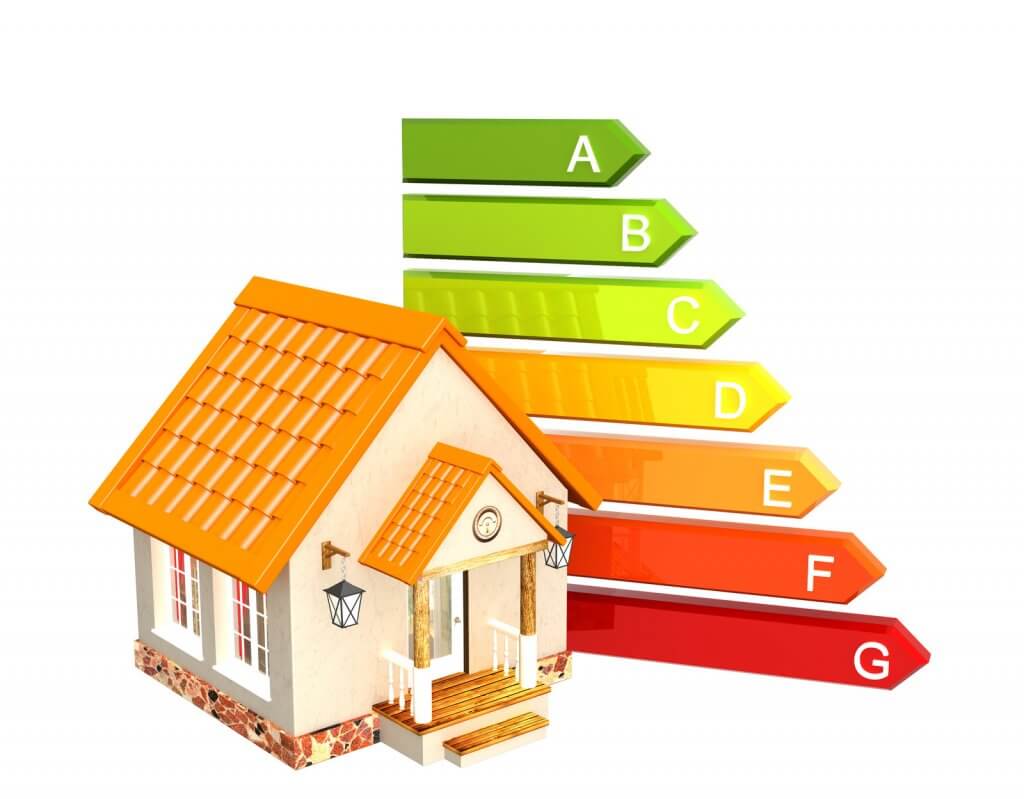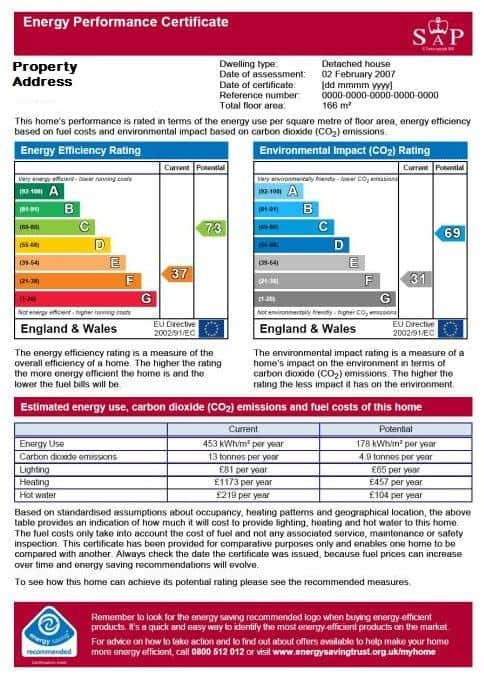
This article forms part of the K&G Lettings Limited Tenants guide series which aims to explain the basics when renting a property. This article focuses on one of the key documents when letting a property – the energy performance certificate.
What is an energy performance certificate?
An Energy Perfromance Certificate (EPC) has been compulsary for all, self-contained rental property let after the 1st of October 2008. The certificate gives a property an energy efficiency rating. The rating ranges from the most efficient A to the least efficient G. The certificates (See Figure 1) are very similar in appearance to the energy performance certificates already included on domestic appliances such as fridges and washing machines.

FIGURE 1: AN ENERGY PERFORMANCE CERTIFICATE
The certificates are produced using standard methods which means the same tests are undertaken on each house, allowing direct comparisons to be made between houses of the same type.
Why is an energy performance certificate important?
Providing an energy certificate is now compulsory for all residential rental properties, and must be provided free to tenants, on request. As energy performance certificates use standard methods they allow tenants to compare the energy efficiency of properties. This allows the energy performance of a property to be considered by tenants when choosing a rental property.
What buildings need an energy performance certificate?
All self contained rental property let after the 1st October 2008 require an energy performance certificate. The certificate is only required for a property which is self-contained. A certificate is not required for individual rooms, for example, when a tenant rents a room and shares facilities such as in a shared house (House in Multiple Occupation).
What does an energy performance certificate tell a tenant?
An Energy Performance Certificate (EPC) outlines how energy efficient a property is, rating the property from A, the most energy efficient to G the least efficient. It allows the tenant to compare directly between properties of the same type, for example semi detached houses, for energy efficiency and fuel costs.
When reading an EPC the tenant must consider how energy efficient the type of property they want to rent could be. It is unrealistic to think that a property built under different energy efficiency requirements could achieve the same energy efficiency rating as some modern properties. A modern energy efficient property may not provide the same size of living space as the larger, less energy efficient properties. An EPC should be seen as one part of a host of factors which must be considered when making a decision on the most suitable house.
What if a tenant is not given an energy performance certificate?
The landlord must make the Energy Performance Certificate (EPC) and the recommendation report available free of charge at the earliest opportunity but, no later than:
- When a landlord provides written information about the building in response to a request for information from the tenant; or
- when a viewing is conducted; or
- if neither of those occur, before entering into a contract to let the property.
A recommendation report details the work which could be undertaken to improve the energy efficiency of the property. It can often be unrealistic for the changes contained in the recommendation report to be made, for example, it may recommend the replacement of a boiler in perfect working order to one that is more energy efficient.
If a landlord or letting agent does not provide an EPC when a tenant is entitled to one, the tenant should contact the trading standards department of the local council. Trading standards can issue a fixed penalty notice of £200 for domestic properties where an EPC is not provided.
How long does the energy performance certificate last?
An Energy Performance Certificate (EPC) is valid for 10 ten years and can be reused as many times as required within this period for the property. Only the most recent EPC is valid, if a newer EPC is produced within the ten year period.
Who can undertake an Energy Performance Certificate?
Accredited Domestic Energy Assessors are the only individuals qualified to undertake an assessment and produce an Energy Performance Certificate (EPC) on a domestic rental property. Domestic Energy Assessors can be employed by a company (letting agent, estate agent, energy company) or be self-employed. It is essential when hiring a Domestic Energy Assessor that people check their accreditation is valid and to a recognised accreditation scheme.
How can a tenant improve the energy efficiency of the property they rent?
The recommendation report which accompanies the Energy Performance Certificate details the work which could be undertaken to improve the energy efficiency of the property. A tenant or landlord can undertake the work to improve the energy efficiency. The improvements detailed in the recommendation report vary in their costs and often range from the cheap (installing additional insulation) to the more costly (installing a new boiler – even though the original works perfectly).
Energy efficiency grants are often available to help subsidise the costs of work. To find out more about the Energy Efficiency grant schemes available in Hull and the East riding of Yorkshire, read the K&G Lettings Limited: A tenants guide: Energy saving grants.
Summary
An Energy Performance Certificate has been required on all rental properties since the 1st of October 2008 and allows the tenant to directly compare the energy efficiency of properties of the same type. It is unrealistic to think a property built under different energy efficiency requirements could achieve the same energy efficiency rating as some modern properties without improvements. A modern energy efficient property may not provide the same size of living space as the larger, less energy efficient properties. An EPC should be seen as one part of a host of factors which must be weighed against one another when making a decision on the most suitable house.



